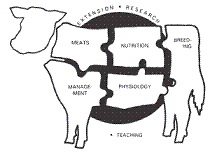Animal Science, Department of

Nebraska Beef Cattle Reports
Date of this Version
2024
Citation
2024 Nebraska Beef Cattle Report
UNL Beef, Institute of Agriculture and Natural Resources, University of Nebraska-Lincoln
Abstract
The young calf is at greatest risk of vitamin A deficiency when cow vitamin intake is low in late pregnancy. Two studies were conducted to evaluate the relationship between cow and calf vitamin A status and how vitamin A status of cow-calf pairs was influence by maternal vitamin A supplementation. In general, calves did not have adequate liver vitamin A concentrations despite cows having adequate liver vitamin A stores following calving. Both cow iver stores and cow vitamin A intake during late gestation influence the amount of vitamin A in colostrum, so it benefits the calf if the cow has both adequate liver vitamin A stores and receives adequate supplemental vitamin A in late gestation. Current supplemental vitamin A recommendations provided to cows fed stored feeds for a year or more do not result in adequate beef cow or calf liver vitamin A concentrations. USDA is an equal opportunity employer and provider.
Included in
Large or Food Animal and Equine Medicine Commons, Meat Science Commons, Veterinary Preventive Medicine, Epidemiology, and Public Health Commons

